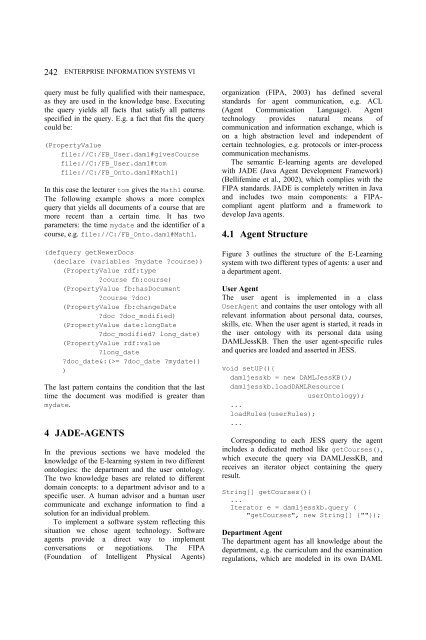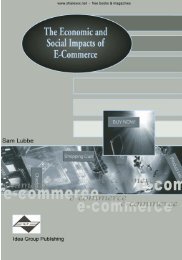Back Room Front Room 2
Back Room Front Room 2
Back Room Front Room 2
You also want an ePaper? Increase the reach of your titles
YUMPU automatically turns print PDFs into web optimized ePapers that Google loves.
242 ENTERPRISE INFORMATION SYSTEMS VI<br />
query must be fully qualified with their namespace,<br />
as they are used in the knowledge base. Executing<br />
the query yields all facts that satisfy all patterns<br />
specified in the query. E.g. a fact that fits the query<br />
could be:<br />
(PropertyValue<br />
file://C:/FB_User.daml#givesCourse<br />
file://C:/FB_User.daml#tom<br />
file://C:/FB_Onto.daml#Math1)<br />
In this case the lecturer tom gives the Math1 course.<br />
The following example shows a more complex<br />
query that yields all documents of a course that are<br />
more recent than a certain time. It has two<br />
parameters: the time mydate and the identifier of a<br />
course, e.g. file://C:/FB_Onto.daml#Math1.<br />
(defquery getNewerDocs<br />
(declare (variables ?mydate ?course))<br />
(PropertyValue rdf:type<br />
?course fb:course)<br />
(PropertyValue fb:hasDocument<br />
?course ?doc)<br />
(PropertyValue fb:changeDate<br />
?doc ?doc_modified)<br />
(PropertyValue date:longDate<br />
?doc_modified? long_date)<br />
(PropertyValue rdf:value<br />
?long_date<br />
?doc_date&:(>= ?doc_date ?mydate))<br />
)<br />
The last pattern contains the condition that the last<br />
time the document was modified is greater than<br />
mydate.<br />
4 JADE-AGENTS<br />
In the previous sections we have modeled the<br />
knowledge of the E-learning system in two different<br />
ontologies: the department and the user ontology.<br />
The two knowledge bases are related to different<br />
domain concepts: to a department advisor and to a<br />
specific user. A human advisor and a human user<br />
communicate and exchange information to find a<br />
solution for an individual problem.<br />
To implement a software system reflecting this<br />
situation we chose agent technology. Software<br />
agents provide a direct way to implement<br />
conversations or negotiations. The FIPA<br />
(Foundation of Intelligent Physical Agents)<br />
organization (FIPA, 2003) has defined several<br />
standards for agent communication, e.g. ACL<br />
(Agent Communication Language). Agent<br />
technology provides natural means of<br />
communication and information exchange, which is<br />
on a high abstraction level and independent of<br />
certain technologies, e.g. protocols or inter-process<br />
communication mechanisms.<br />
The semantic E-learning agents are developed<br />
with JADE (Java Agent Development Framework)<br />
(Bellifemine et al., 2002), which complies with the<br />
FIPA standards. JADE is completely written in Java<br />
and includes two main components: a FIPAcompliant<br />
agent platform and a framework to<br />
develop Java agents.<br />
4.1 Agent Structure<br />
Figure 3 outlines the structure of the E-Learning<br />
system with two different types of agents: a user and<br />
a department agent.<br />
User Agent<br />
The user agent is implemented in a class<br />
UserAgent and contains the user ontology with all<br />
relevant information about personal data, courses,<br />
skills, etc. When the user agent is started, it reads in<br />
the user ontology with its personal data using<br />
DAMLJessKB. Then the user agent-specific rules<br />
and queries are loaded and asserted in JESS.<br />
void setUP(){<br />
damljesskb = new DAMLJessKB();<br />
damljesskb.loadDAMLResource(<br />
userOntology);<br />
...<br />
loadRules(userRules);<br />
...<br />
Corresponding to each JESS query the agent<br />
includes a dedicated method like getCourses(),<br />
which execute the query via DAMLJessKB, and<br />
receives an iterator object containing the query<br />
result.<br />
String[] getCourses(){<br />
...<br />
Iterator e = damljesskb.query (<br />
"getCourses", new String[] {""});<br />
Department Agent<br />
The department agent has all knowledge about the<br />
department, e.g. the curriculum and the examination<br />
regulations, which are modeled in its own DAML









